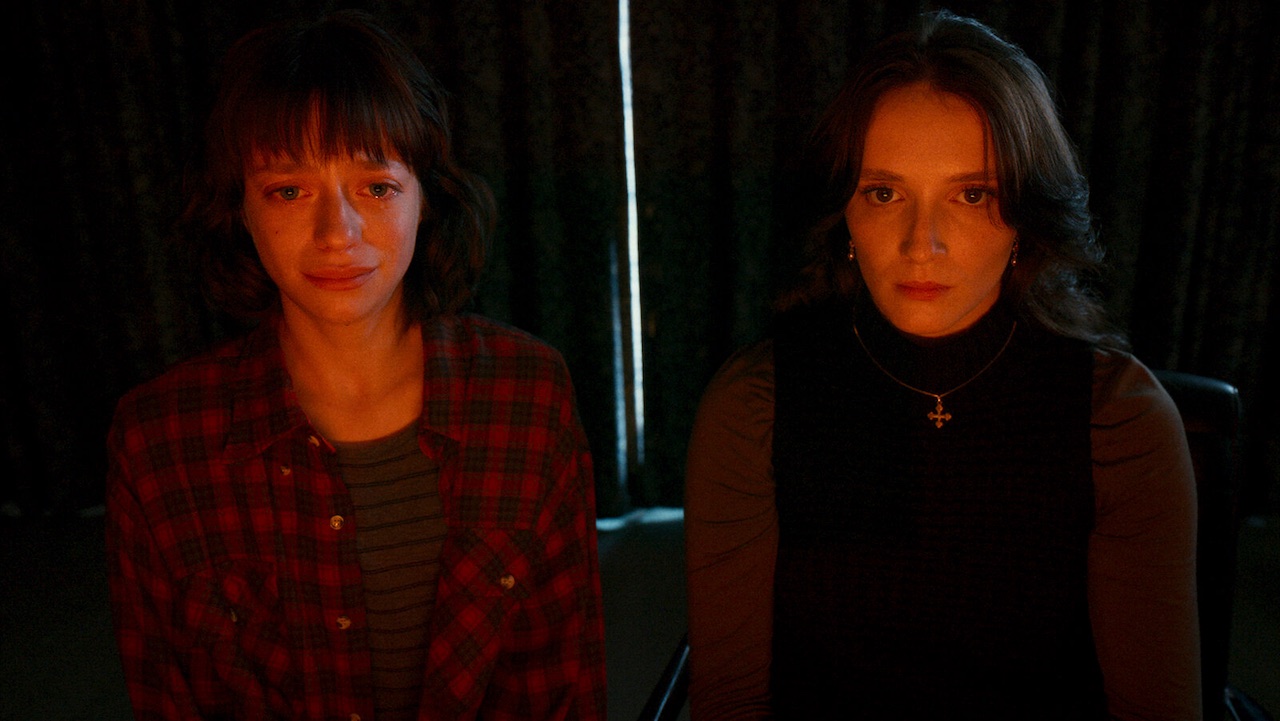Like every annual tradition, the sudden cultural shift toward all things autumnal seems to come earlier every year. This, of course, includes Spooky Season, a time when even the most horror-averse moviegoers dip their toes in the world of terror. Of course, there are some for whom depravity isn’t seasonal. It’s the difference between people who like to be scared and those who seek out anything—no matter how revolting—that will truly shock them. It’s the seasonal tourists versus the true sickos. As you might have guessed, I tend to count myself among the latter category, rarely frightened and almost never scandalized.
Even so, I pale in comparison to the characters populating Pascal Plante’s psychological thriller Red Rooms, a film which centers around an obsessive so unperturbed by wickedness that the film inspires a host of questions regarding the very meaning of passive observation. Plante doesn’t play coy in his aims in this regard. The film’s lengthy opening sequence is unsparing in its portrayal of the opening moments of a particularly grisly murder trial. With less of the pomp we might get during an American trial, lawyers for both the prosecution and defense lay out the circumstances of the trial in concise, unsentimental terms; the defendant, Ludovic Chevalier, is accused of murdering and dismembering three young girls while broadcasting the act on a dark web host called a “Red Room.”
Plante’s chillingly placid camera works its way around the drab, almost brutalist confines of a Montreal courtroom with precision during these moments, both distressingly removed and unwilling to provide us any cover from the horrors being described. It isn’t until the camera begins to slowly zoom in to the striking image of Juliette Gariépy as Kelly-Anne that the true narrative, and Plante’s own damning indictment, begins to take shape. Kelly-Anne, we soon learn, has no real connection to the trial, permitted to sit in along with a select few who show up early enough to get a spot in the countroom’s (for lack of a better term) fan seating. We don’t know why she’s there, but soon find her making a connection with a particularly eccentric fellow observer named Clémentine who, unlike Kelly-Anne, is devout in her assertion that Chevalier is innocent, has been set-up, and has the kind eyes of a man who could never do such a thing.
It’s not difficult to see how Clémentine fits into an ever-growing world of theorists, sleuths, and “truth-tellers,” her obsession sad and frightening in equal measure. But Plante is wise to avoid obvious caricature, even in Clémentine’s most heightened moments. Kelly-Anne, on the other hand, is something else altogether. So much of Gariépy’s often-arresting performance is constructed of hard stares and rigid precision, existing in almost complete opposition to Clémentine’s flighty emotionalism. We’re well aware of her obsession, but her reasons are never made plain. Her commitment, however, is never in question, a fact brought to light in a few sequences of utterly ruthless dread that likely won’t be topped this year.
Plante isn’t all that concerned with Chevalier, instead focusing squarely on what it means to give yourself over so fully to the darkest corners of the human psyche.
Up to this point, Plante has flirted with the film’s driving thesis in ways both direct and a bit obvious. Just as true crime has become a defining movement in popular culture over the past decade, so too has the valid questioning regarding its morality. Clémentine is obsessed with the accused, not the victims, an important distinction that seemingly characterizes dozens of new Netflix murder documentaries every year. And while Plante is no more interested in the three victims than Clémentine, he’s also not all that concerned with Chevalier either, instead focusing squarely on what it means to give yourself over so fully to the darkest corners of the human psyche. As it turns out, Kelly-Anne is lightyears ahead of anything even someone as devout as Clémentine could possibly imagine in that regard.
During the trial, much is made of the murder porn that Chevalier is accused of broadcasting on the dark web. But when Kelly-Anne offers to show Clémentine her own ripped stream of the killings, it becomes a defining moment for both characters. While Plante doesn’t go so far as to show us the video with any clarity, planting the camera on the two women’s faces is more than enough. It’s immediately clear that Clémentine is out of her depth, and that all her boasting about belief was more about personal meaning than anything else. Kelly-Anne’s reaction is far more profound, her wide-eyed, unflinching glare somewhere between titillation and genuine arousal. When she forces Clémentine to watch a second video, despite her misgivings, we can no longer feign ignorance regarding Kelly-Anne’s sinister impulses.
Whether she’s able to redeem herself in the film’s final moments (which I won't spoil here) is up for debate. Those plot mechanics may be important to anyone looking for a tidier serial-killer thriller; but Red Rooms ultimately seems only loosely interested in such a thing. I mentioned earlier that I was thankful Plante doesn’t show the videos in question—and I am, right? There's something about Kelly-Anne's face during those moments—the red glow of the computer screen, the subtle twitch of the muscles, the hardened determination—that I can't stop thinking about. How does my own face, that of an avowed horror sicko, look in moments before a gnarly kill or twisted reveal? What do I want out of those moments? What do I get? The lines between interest, obsession, and sadism aren’t so thin, are they?
If my conclusions seem tepid, perhaps it’s for fear of self-incrimination, of seeing even a little bit of myself in Kelly-Anne's detached gaze. Spooky season, indeed.







